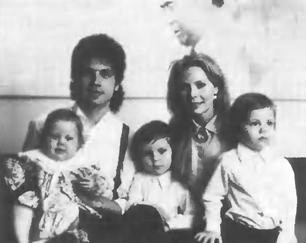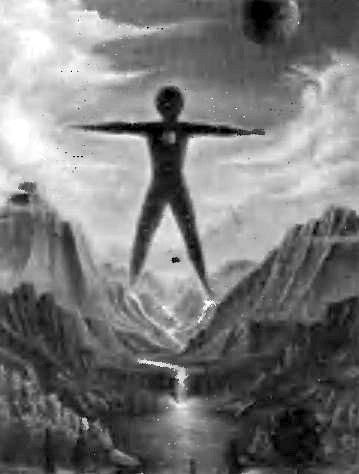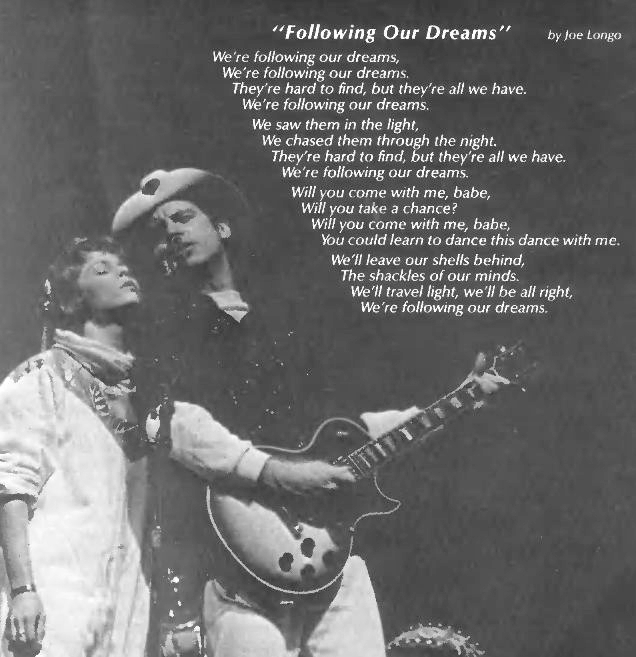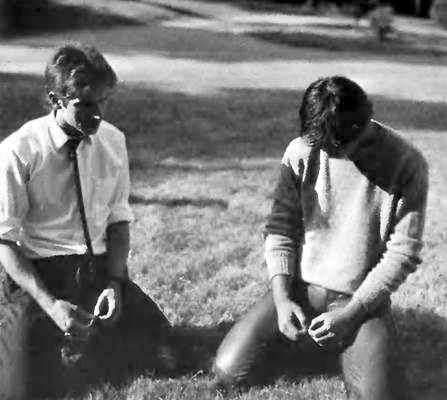![]()
The Words of the Longo Family
|
|
The Words of the Longo Family |
Joe and Felicia Longo and their band Ancestors recently created a rock video called "Following Our Dreams," which was premiered at evening entertainment on Parents' Day, 1987, in the Manhattan Center. It was also shown on a recent Unification Video News.

The
Longo family. Left to right: C., Joe, Chen West, Felicia, and
Orien Joseph.
Question: How was your video created? Who is it intended for, and what is its content?
Felicia: About a year and a half ago, Rev. Kwak approved the idea for this video. We had been planning it for about four years. It was a cooperative project of the Performing Arts Department, the Manhattan Center, and New Future Films, who donated their equipment and a lot of their time in the editing room. It was one of the first art projects ever done involving so many different groups. Ed Reno was the main cameraman, and he did the majority of the editing with the help of Bill Miho and Joe. Rod Cameron provided the still photographs.
The words and music to "Following Our Dreams" were written by Joe quite a while ago. We picked this piece because of the message, and because it's the kind of music that best showcases Joe's voice. We felt a rather romantic song would really touch people. The audience we were aiming at was young people.

Visionary
paintings by Benny Anderson were used in the video.
One of the purposes of this video was to show the idealism of our movement and the mystical aspect of our beliefs. The music is rather slow and heavy, and what we're wearing is not very heavenly, but several visionary and spiritual paintings, done by our brother Benny Anderson, are used at different points in the video as a backdrop to the band. The message is that we have to live in this world but keep our idealism. We're hoping that by dressing the way we do and arranging our music in a certain style, we can grab young people's interest. And once they're listening, they'll hear the message. We sent the video to MTV, and it's being reviewed by them right now.
Some of the roots of rock music are very resentful and decadent, but the other side is very idealistic, humanitarian, and righteous. The music we do is based on the most Abel-type folk-rock tradition, which represents a search for true values. It's responsible music. Right now there's a resurfacing of the idealism of the sixties, which I feel we can capitalize on. In the sixties there were groups in a messianic position, like the Moody Blues and the Beatles, who were looking for an ideal world. We want to let people know they can still find those ideals. With this video we're saying, "Hey, we're following our dreams. The dream is real. Why don't you' come with us?"
The specific audience Joe and I want to target is the more intellectual, college people, because college rock stations set the trend for the rest of the country. Surprisingly, every time we play in public, our most spiritual songs get the biggest response. We shouldn't underestimate our audience, because there are so many people waiting to hear something positive. Americans are actually very spiritual, and they respond very much to truth.
The AIDS epidemic is also making people think about what's right and wrong and what life is all about. Right now there is a definite trend among college students towards purity. If we can represent a good standard, people will respect that.
Father once told Joe, "Please don't drink or smoke or do drugs or any of those things, because you could make someone else stumble, someone who is weaker than you. And don't accept anyone in your band who has any of those problems." He said you just cannot compromise that standard. Actually, Joe and I have a reputation for being puritans, but we feel we have to be that way because we're in a position to affect a lot of people.
We're not keeping it any secret that we're church members. Once we be- come pretty well known and people find out we're members of Rev. Moon's church, they'll say, "Gee, these guys believe in arranged marriages and fidelity and are trying to live a pure life." I think they'll be intrigued.
Question: When did your group first come together and how?
Felicia: We're still being born. Over the past year or two we've had some change of personnel. Right now our band consists of Joe and myself, Bill Miho, and a young drummer we met a year ago through a newspaper ad. This young man really believes in what we're doing. He's played on church holidays, and he went to a CAUSA workshop last weekend. Now he's saying, "Joe, we've just got to get your message out." So he's pushing us to do our mission. This is a good way of doing home church in the music world.
Question: What are your musical backgrounds?
Felicia: I have a classical music back- ground. I joined the Performing Arts Department in 1976 at the time of the Yankee Stadium and Washington Monument rally. Shortly after that, Father picked me and three other members to work on the New York City Symphony staff. Later I started performing with Joe in the J.C. Chen band. This past year I've been helping David Eaton manage the orchestra while at the same time helping Joe.
As a young boy, Joe used to sing in clubs with his father, who was a country-western singer. He was in his first rock band when he was around 11. Joe joined Sunburst in 1976, and in 1982 he worked with Hyo Jin Nim and the Yu band. I'm more formally educated when it comes to music, and he's much more the singer and songwriter and lyricist. We depend on other people to do the arranging. We're both still growing.
Question: Joe, how did you come to work with Hyo Jin Nim?
Joe: Because of the kind of music In Jin Nim had heard me do on holidays, she felt Hyo Jin Nim and I would get along well, so she introduced me to him. We found there was a real affinity between us, based among other things on the fact that we both liked powerful rock music. He and I used to talk together a lot about how as a church we've been unable to reach a certain section of young people. Hyo Jin Nim believed they could be reached through strong rock music.
He said the problem was that members were asking people to jump up to a certain level, saying in effect, "We're up here, here's our standard: Now jump." He felt we had to go down and speak to them on their level. He turned me on to an even heavier version of rock music than I was into. Hyo Jin Nim liked heavy metal.
Felicia: When Hyo Jin Nim was in high school, the more conservative kids persecuted him a lot for being Father's son. But the ones who stood up for him were the ones more on the outside of the social strata. Even though they weren't so clean, they actually had a righteous streak in them, and they protected him. And I think based on that, he began to look into the kind of music they were into -- heavy metal.
Question: Has Father spoken with you about this type of music?
Joe: He's talked quite a bit about it. One time he said to me that it's wrong to think classical is the only music to listen to and it's wrong to think rock is the only music to listen to. True music will come when there is a merging of the extremes. The kind of advice he's given us is the same he's given to the classical artists -- be dramatic and put a lot of hills and valleys into the music.
Father seems to respond best to our strongest, most powerful, most majestic-sounding rock songs. He told us that it really was the rock bottom of hell we were restoring and that we should make it the "rock top." A couple of times Father and Mother came to listen while we rehearsed. We were playing very, very loud. Once Father said, "There's no evil spirits around here, because your music's so loud, it scares them away."
It's not that rock music is better or worse than any other type of music; it's just that it's a language. I heard that Jesus recently said through a medium that if we want to reach other Christians we've got to speak their language -- use the name of Jesus. Since the majority of young people all over the world are into rock music, we want to speak to them and let them know that God is real.
Classical music represents the ideal, but first people need a release. There's a lot of rage and resentment that comes out in punk rock and heavy metal music. Essentially, it's a rebellion against what's untrue in the world. Kids don't know what to do with these feelings because they don't have parents able to guide them, so they get it all out through their music.
Felicia: So in a way it's healthy, because they're rejecting the world's values. The problem is, they don't have anything to replace them.
Joe: Satan takes the most beautiful elements that God creates and then leads people astray with them. Heavy metal represents the powerful side of God -- it's like God's thunder and lightning. And more and more, heavy metal is merging with classical music. It's true that a lot of the lyrics are about sex and drugs, but there's also a romantic, spiritual aspect to it. It's warrior music. I think that's what attracts a lot of young people. The real danger of the music is that Satan takes that bait and just slips in poison.
We just want to make sure that Father's word is communicated everywhere, even to places the church wouldn't normally reach. In the darkest places there's always a chance we can find someone who's been trapped by Satan and who might completely change by hearing the truth once.

Joe
and Felicia perform at the Manhattan Center on God's Day 1983.
Question: How did you come to be a songwriter and how did you come to initially join Sunburst?
Joe: I wrote my first song on MFT. What made me write it was a desperate desire to communicate. On MFT I didn't have time to write my younger brothers and sisters who were at home, and I knew they felt abandoned by me. So I thought, if I could just tell them what I was going through in one letter, then maybe they could understand. So I wrote songs for my youngest brother and my youngest sister. That was the beginning.
There was a point on MFT when I was a team leader in Buffalo. The day before we were about to enter a 40- day condition, I got trapped in a traffic jam on my way to pick up my members. So I turned on the radio and the Rolling Stones came on. Now, during my whole MFT time, I never thought I would play music anymore. I didn't think I had the desire to. But I heard this Rolling Stones song, and even though it was on just a few seconds, the melody was so catchy, I just kept singing it.
No matter how much I tried to get it out of my mind, the profound simplicity of it got in. And I thought, if this melody had some great message attached to it, it would be incredible. I tried everything to get it out of my brain, but I just broke down and started crying. Finally I pulled the van over to the side and got out and prayed. I said, "God, You need a rock and roll band. If You're serious about witnessing to young people, You've got to use this medium. I don't care if I ever do music again. But I'm telling you, if You want to reach young people, You gotta use rock and roll!"
The next day was the first day of our condition. I drove my team two hours out to Syracuse. It was a blizzard, and the snow was blowing side- ways. When I finally got to Syracuse I dropped all my members off and I called in to my commander. He said, "Come back right away. There's been a call from New York. I'll explain when you get here I said, "But I just dropped all my members off in the snow!" And he said to me, "Never mind. I'll pick them up." So I drove back to the center and my commander told me I was to take a plane to New York right away.
When I got to New York I thought I was going to be in a competition for a holiday, but it was actually an audition for Sunburst. Within a few days I was auditioning for Father. They must have found my name in a computer, but no one else knew that I had prayed that prayer except God. Because of my conversation with God, I knew that I was being pre- pared to use the rock medium -- not anything else. So since that day I've been with this mission.
There are points in our life where we have to separate from certain things. We should cut our hair, cut off from the style of clothing or the kind of music that we like. When we first join the church I think there should be no compromise at all -- there should be total separation from attachments like that. But there comes a point when we've got to go into those dangerous areas that might trap our children, and try to restore them. I don't think God wants to live in fear of His children being led away by anything. I want to go into every place that's a threat -- all the dark, mysterious, scary places -- and turn on the lights and knock the ceiling out and say, "Here's the light, man!"
Father's children have been influenced by the exciting elements of rock music, but they aren't dominated by it at all. They're strong enough to handle it. But we have to be careful. It's a very powerful, seductive medium. But the medium itself belongs to God: every chord structure, every note of music is God's, and we've got t.. claim it back.
Question: What is it that keeps you from being dominated?
Joe: A lot of it is prayer, but I feel it's important to go through as much of the formula course as you can. It's not a matter of will power, it's a matter of your foundation. And you have to reach a point in your church life when you're not resentful about the years of discipline you went through. The strict training we get is incredibly valuable; it turns us around. When you have gone through enough training, you can be exposed to almost anything and not sink. Whenever we're performing, Felicia and I try to pray constantly that the things we are trying to say through our music are reaching people.
The members of the church are the most remarkable people in history, but most of the time we don't realize it. I really want to create a heroic picture of what our movement is about so young people can understand us. Satan has painted a picture of us that makes people afraid of us. We want to tell them, "Hey, Satan is not writing the script here about what's hip and what's not hip. God writes the script and these people are what's hip."
Father is very free and constantly does things that shock people. He is not locked in by concepts. We can't be afraid to speak to people sincerely with every part of us. Felicia and I happen to be reaching out to people in the rock world. The things we wear are not in praise of rock culture; it's just so that we are more relatable to people of that culture.
Really, we Moonies shouldn't compromise at all. If your central figure asks you to cut your hair, then you should cut your hair, unless you can convince him of the value long hair has in your witnessing. Unless you can sincerely convince your central figure of your viewpoint, you should obey him. If you can't convince him, you don't have the right to get resentful towards him for not understanding you. If you have to serve that person for three years in order to convince him, then do it. Whatever it takes.
Question: As a couple working on the same project, you are rather unique in the church. Can you share you experiences in working as a family in this type of mission?
Felicia: At first it was very difficult for us to work together as a couple because I had to give up what I was doing. As with everything, we had to lay a foundation. And it's hard to take care of a family and continue a public mission. I feel that now I'm finally breaking through. I've always been supportive of Joe, and I really believe in him. Even if I weren't married to him I would support him. We're really each other's best friend. He is always willing to help me fulfill my family and my career responsibilities. He knows women artists have a very difficult course.
Some people have said to us, "Why did you have children right away when you're doing such an important mission?" But we felt we had to start having children because it is completely opposite from what the rest of the rock world is into. We want to create a new tradition. I believe if you want to be a great artist, you first have to fulfill your Blessing as much as possible, because if you think you're going to achieve more by not taking on that responsibility, you'll hit a dead end.
How can we be public people if we're not parents? Our main concern wasn't our music; it's whether we are qualified to take care of people. We're grateful that we have three children because, although it did put a burden on us, we needed this experience in order to grow. I used to get very con- fused because there are so many things to take care of -- performing with the band and taking care of the children and working with the orchestra. Now I'm able to do many things at a time; I've also learned how to ask for help. Actually, we all have to be- come this kind of person; otherwise God can't use us on a larger level. If we're going to become like Father and Mother, then we can't just be individuals doing our art.

Joe
and Heung Jin Nim praying at Barrytown in the spring of 1983.
Question: Felicia, have you had any experiences with the True Children while working in this band?
Felicia: Heung Jin Nim used to talk with Joe a lot. Heung Jin Nim was an aspiring young artist, and Joe also loves to draw and paint. Heung Jin Nim always made you feel comfortable no matter who you were. Sometimes I used to feel shy around Hyo Jin Nim or In Jin Nim, but never around Heung Jin Nim.
He was always giving things away. One time Joe was performing with Hyo Jin Nim on a church holiday, and they were supposed to wear white pants, but Joe didn't have a pair. Heung Jin happened to be wearing white pants, so he offered to exchange them just like that. I have a shirt that Heung Jin Nim gave me one God's Day. The True Children were playing yute, and he was the team leader. He had on a yellow sweatshirt that he had just painted a cat on. He took the shirt off and gave it to me. Even when he was busy doing something he was always aware of everybody around him.
We asked Hyo Jin Nim to name our twins, so he named one "West" and one "Orien." He said, "The first-born should represent the West, the external environment, and the second- born should represent the East, the internal spiritual side"
Question: What are the goals of this group, and what is your vision for the future?
Felicia: Our external mission is to 'address the problems and sufferings of the young people out in the world and to offer them hope. This we do through the songs we perform in clubs. I would say our internal mission is to connect to where the church members are internally, to understand their unique struggle, and to write music that liberates them. This is the music we play on church holidays.
We've collaborated on a few numbers with the New York City Symphony, and I think in the future we will do more of that. We call it merge music because it's merging the classical traditional with contemporary music. The orchestra musicians are very excited about it.
We will continue to work as a band, but I think we will also be doing things on a larger level, like writing a rock opera. Up until a few years ago we were really on our own. But ever since Hoon Sook Nim's and Heung Jin Nim's Blessing, and especially now that Father has founded the Universal Ballet Company, I feel a blessing has come to the whole cultural providence.
As a church we have to create a new culture. There is a lot of creativity needed. On one of the upcoming holidays I'm going to hold an audition, like a talent search, for members -- to see who's out there and what they can offer. If any members have any questions about our music or the kind of work we're doing, we really encourage them to write to us.